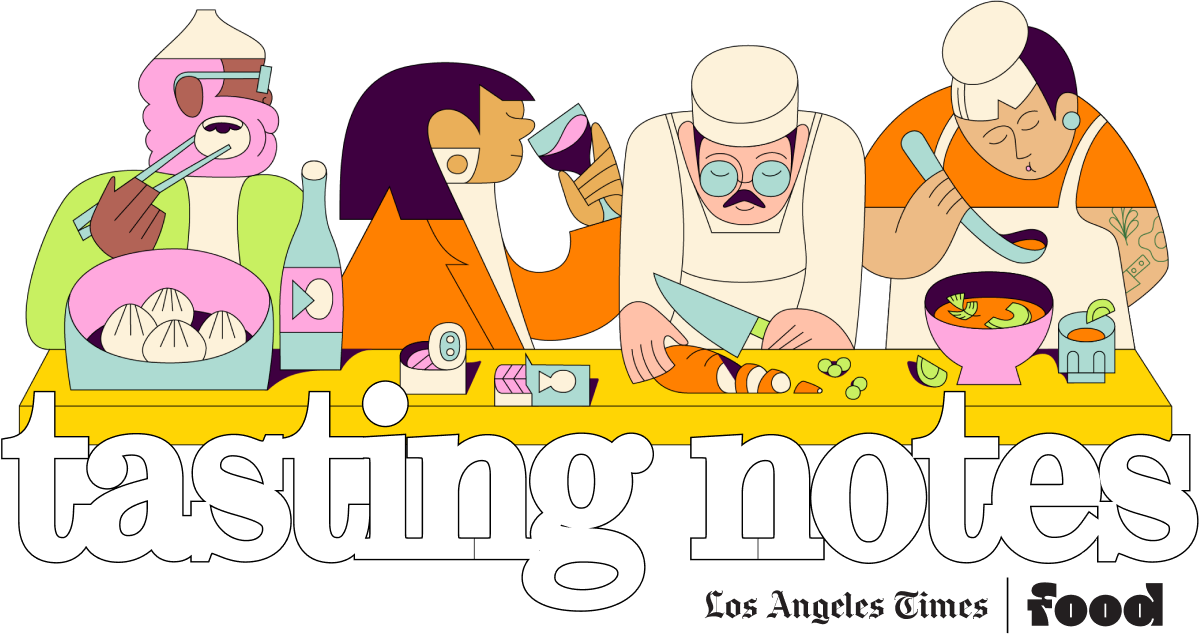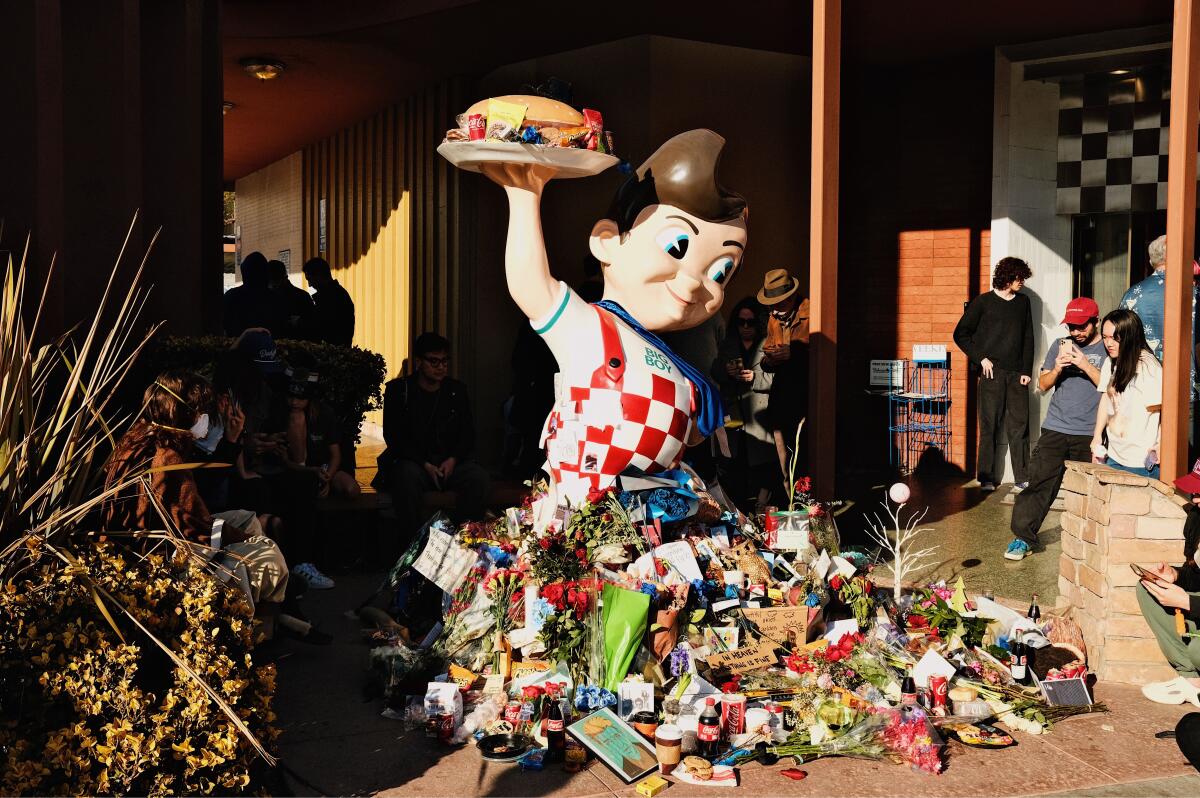Milkshakes and tuna melts, plus notes from the recovery, chef’s wish lists, SoCal’s James Beard nominations and Lunar New Year eating. I’m Laurie Ochoa, general manager of L.A. Times Food, with this week’s Tasting Notes.
Newsletter
You’re reading Tasting Notes
Our L.A. Times restaurant experts share insights and off-the-cuff takes on where they’re eating right now.
You may occasionally receive promotional content from the Los Angeles Times.
Seeking the Silver Goblet
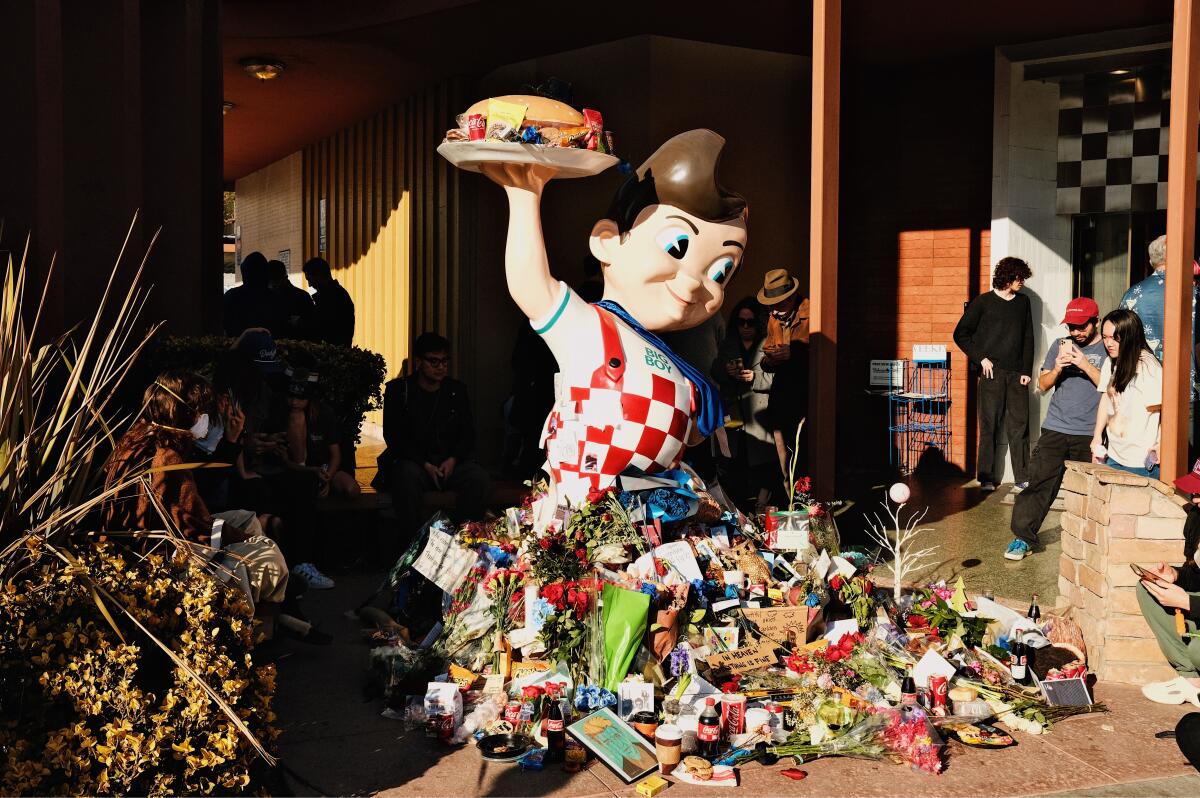
The impromptu memorial for David Lynch outside Bob’s Big Boy in Burbank on Jan. 20, the late director’s birthday.
(Stephanie Breijo / Los Angeles Times)
I’m sitting in a booth at Bob’s Big Boy in Burbank with a distorted simulacrum of a David Lynch meal. Black coffee. Tuna melt. Fries. Chocolate shake.
A week after the death of the director and artist who brought us “Blue Velvet,” “Twin Peaks” and “Mulholland Drive” I am just one more fan paying my respects through a coffee shop meal to one of our greatest Angelenos — “so at home,” wrote New York Times chief film critic Manohla Dargis, with our city’s “distinct, otherworldly mix of beauty and disaster, sunshine and noir.”
Outside, someone has already cleaned up the accumulation of mementos and heartfelt messages left under statue of a grinning Bob, many inscribed with the line sung by “Eraserhead’s” Lady in the Radiator: “In heaven, everything is fine.”
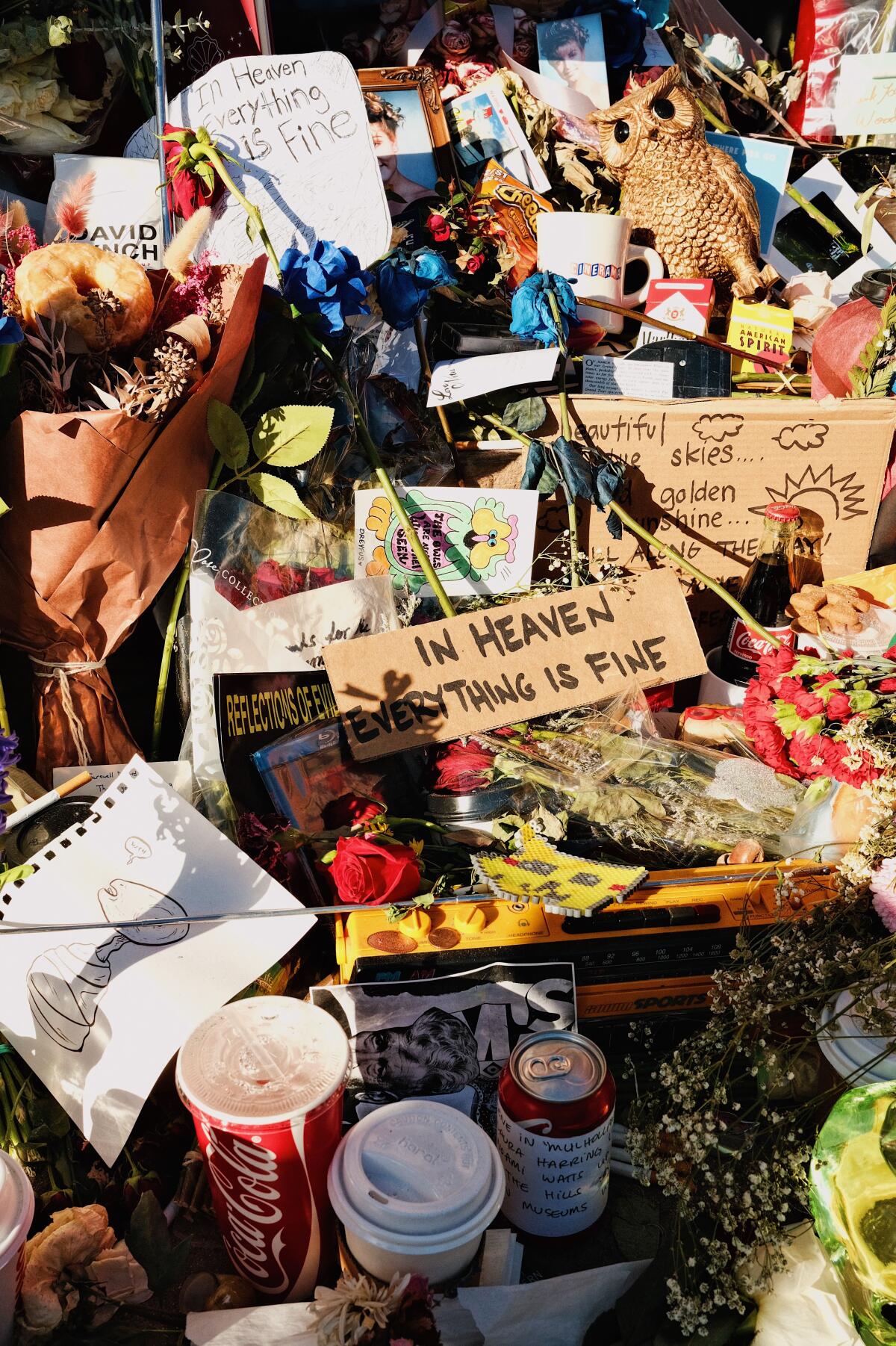
The impromptu memorial for David Lynch grows outside Bob’s Big Boy in Burbank.
(Stephanie Breijo / Los Angeles Times)
Lynch famously ate at a Bob’s Big Boy nearly every day during the early years of his career at 2:30 in the afternoon — the optimal time, according to his own telling, for getting his favorite Silver Goblet chocolate milkshake at the just-right cold temperature plus a cup of coffee.
But by December 1988, when director Guy Girard brought Lynch and critic John Powers to a Bob’s Big Boy booth for the French documentary “Don’t Look at Me,” the coffee shop’s chocolate shake was more a memory of perfection than reality.
“Sorry, sorry,” Lynch says in the opening scene of “Don’t Look at Me,” when a pony-tailed waitress brings a chocolate shake to the table just as the director is about to make a point about how the perfect jewel-like placement of a duck’s eye is an example of the need to get details right (“If they’re wrong, then it throws you out of the mood.”)
“You used to have a thick ice cream,” Lynch tells the waitress when he sets his director’s eye on the chocolate milkshake made with ordinary ice cream instead of the thicker soft-serve style “kind of a tube of ice cream” that had come out of a Taylor machine for the Silver Goblet shakes.
“They don’t have it,” the waitress says.
“I don’t believe it! … You don’t have it anymore?” the director says. “What happened?”
The waitress says something about the machine possibly being broken but the interaction makes it clear that Lynch’s Bob’s Big Boy habit had already come to an end.
Later in the documentary, “Eraserhead” star Jack Nance is riding in a convertible through downdown L.A. with Lynch and asks the director about his current eating habits: “What are you having these days?”
“Turkey sandwiches or tuna melts … with Swiss cheese, golden brown French fries and coffee,” Lynch says. “Maybe a piece of cherry pie or blueberry pie for dessert. How does that sound to you?”
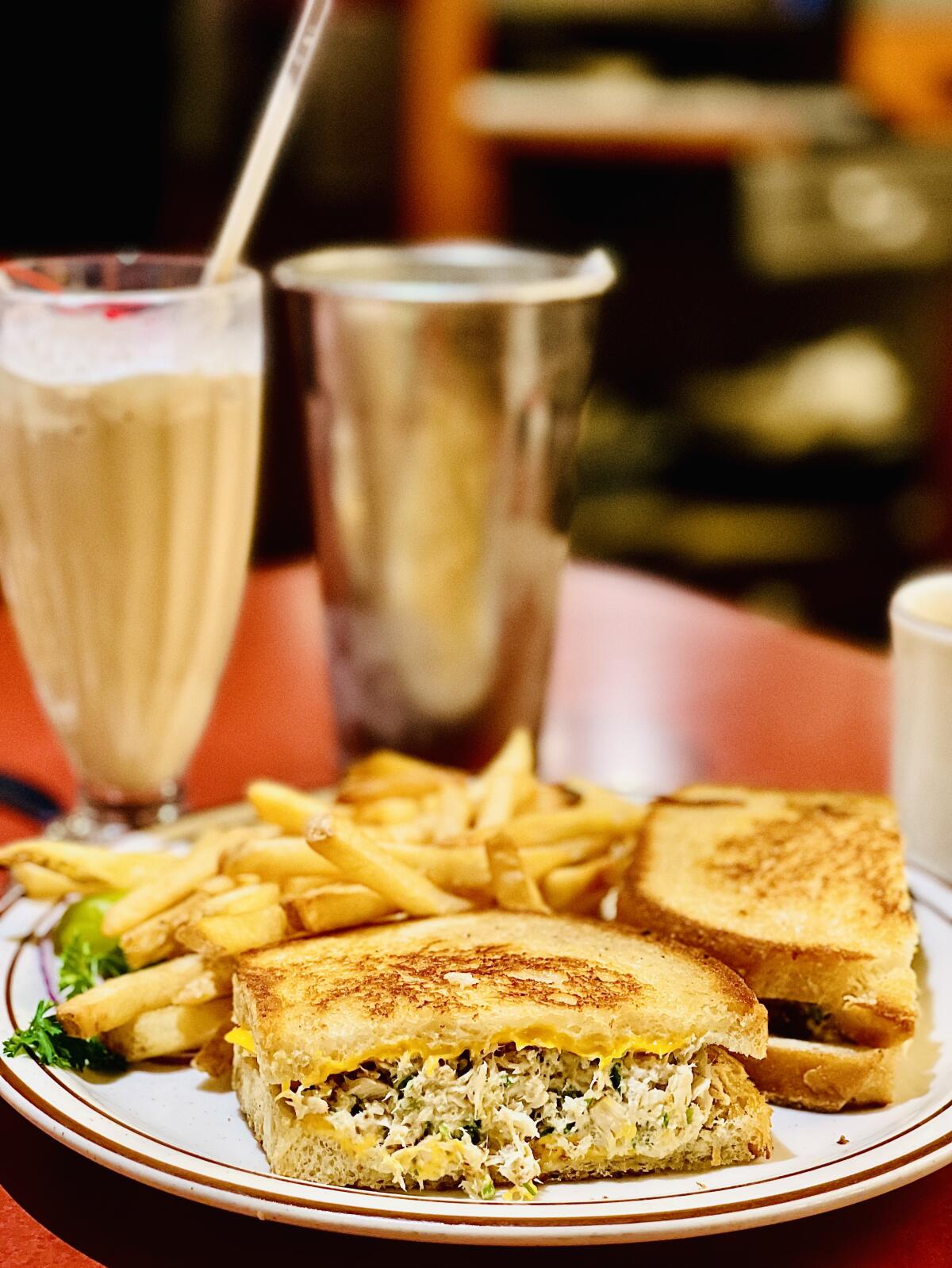
A tuna melt, fries and a chocolate shake at Bob’s Big Boy in Burbank.
(Laurie Ochoa / Los Angeles Times)
The Bob’s Big Boy tuna melt I order comes with American cheese melted on the inside of each slice of buttered and grilled sourdough bread, not the Lynch-specified Swiss cheese. And it goes without saying that my chocolate shake would not meet Lynch’s approval since it’s not the Silver Goblet shake of old. But it comes with whipped cream and a cherry on top plus extra in the stainless steel blender container so I’m content.
I’m also not sure that I am not in the right Bob’s Big Boy. Despite many reports that say Lynch frequented the Burbank location of the coffee shop chain, the exterior shot of the Lynch and Powers scene of “Don’t Look at Me” does not match the grand sweep of the Wayne McAllister-designed restaurant on Riverside Drive. And I find several sources online that say that Lynch actually went to the Bob’s on Wilshire Boulevard near Highland — torn down in 2008 for a BMW dealership. The critic David Chute, for instance, conducted his 1986 Film Comment interview with Lynch at the Wilshire Boulevard Bob’s.
In truth, since the Burbank Bob’s is so devoted to Lynch’s memory, giving him a place of honor in its digital Hall of Fame, I’m happy to be surrounded by fellow fans of the director. Because for most of us, coffee shops and diners have always been nostalgic places more evocative of a bygone time than a true representation.
“Even at their most confounding,” L.A. Times film critic Amy Nicholson wrote in her appreciation of Lynch and his love of “The Wizard of Oz,” “his films are a reminder that the logic of how you get to Oz doesn’t matter. What matters is how Oz makes you feel.
Since I was a teenager sliding into coffee shop booths after football games or seeking a place to gather with friends away from parents’ prying ears, the Googie-era restaurants and their replicas conjured a 1950s vision of America filtered through episodes of TV’s “Happy Days” and grittier portrayals in countless movies. But these spaces are slowly disappearing. When downtown L.A.’s Nickel Diner closed in 2023, co-owner Monica May told me, “We’re a 20th century restaurant.”
Which is why I’m grateful that the Burbank Bob’s Big Boy — one of a diminishing number of restaurants open until midnight (3 a.m. on Friday and Saturday) — seems to be going strong on Wednesday evening when we wait 40 minutes for a table.
“I like a coffee-shop atmosphere,” Lynch told Powers in the L.A. Weekly just after “Blue Velvet” came out in 1986. “It’s an American sort of thing, and I like to sit in those environments and watch people and get ideas sitting there.”
A coffee shop is a democratic space where you don’t have to worry about what you’re wearing and you can blend in with a crowd that defies categorization. Wednesday night at Bob’s, there were evacuees from the Hughes fire in Castaic hoping for the best next to a group of young women in thrift store fur and boots, plus a family in sweats beside two guys in black leather jackets. Everyone had a different story. And while this Bob’s Big Boy may not have had Lynch’s Silver Goblet shake, they still serve a touchstone food from my high school days — the hot fudge cake. Nostalgia on a plate in a well-lighted space.
“Sometimes people don’t want to take a chance and go into darkness to discover what it is,” Lynch told Powers in “Don’t Look at Me.” I like to do that. That’s why I like to go to well-lit places, so I can, if I fall into some strange place, I can come back out and, you know, have a cup of coffee.”
Slow recovery ahead
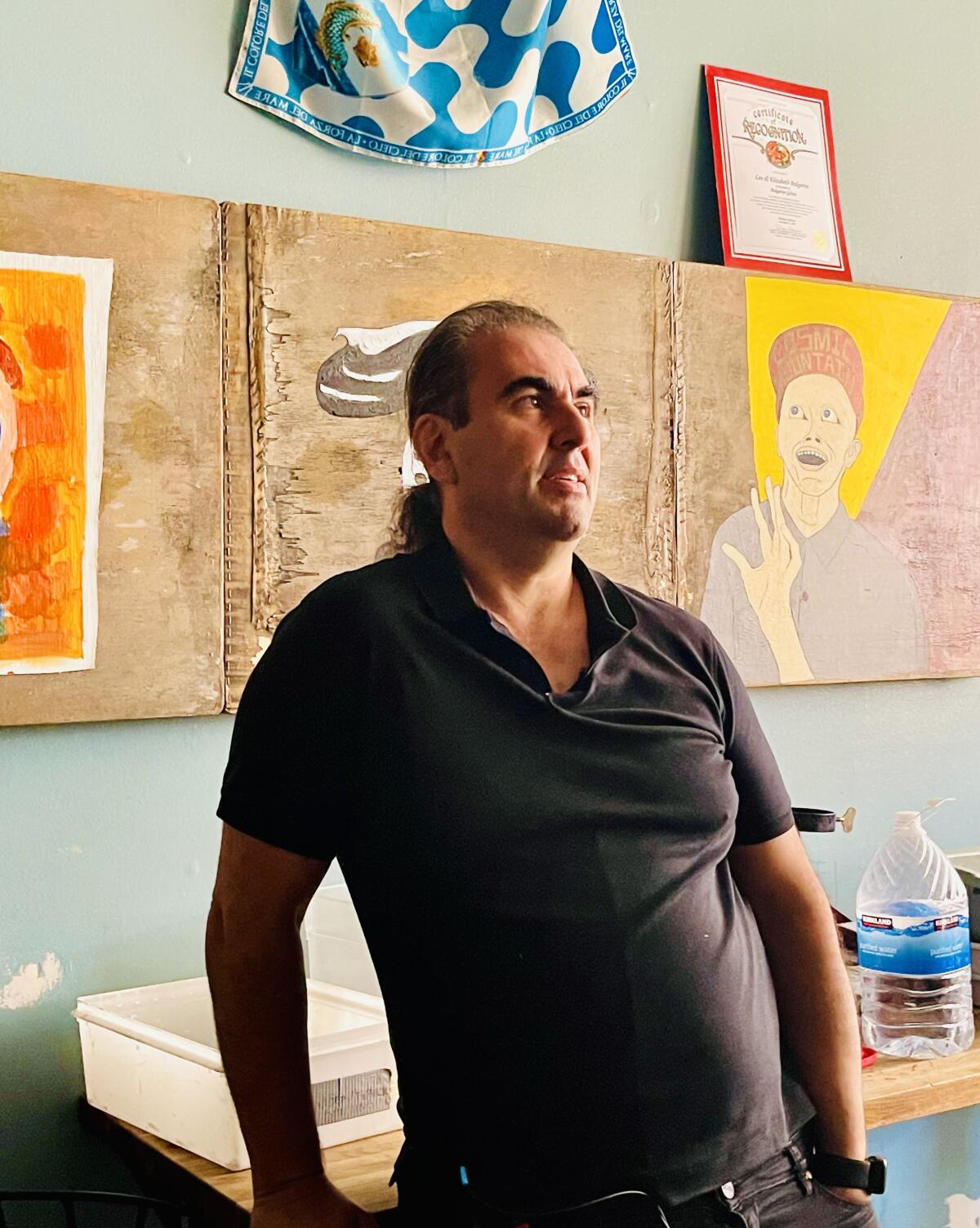
Leo Bulgarini inside his Altadena restaurant and gelateria after the Eaton fire left his business standing but his neighborhood nearly destroyed.
(Laurie Ochoa / Los Angeles Times)
I’ve been eating Leo Bulgarini’s gelato since he had a cart in the courtyard of Pasadena’s Pacific Asia Museum back in 2006. When he and his wife, Elizabeth, opened their own gelateria next to a Rite Aid in Altadena, Bulgarini’s became a favorite afterschool spot for my kids. Soon we started showing up with other families from the neighborhood for summer movie nights when Bulgarini would screen Italian comedies on a wall in the gelateria’s courtyard and serve pasta he made by hand. These pasta-and-movie nights led to Bulgarini transforming the gelateria into a full restaurant and cooking school. The last time I stopped in for gelato with my son it was New Year’s Eve and Bulgarini was expecting a sold-out crowd for the celebration dinner.
Monday, however, I visited Bulgarini with reporter Cindy Carcamo and videographer Albert Lee on a more somber occasion. The Eaton fire had spared his restaurant’s building, but his family home a few blocks away was destroyed and everything around the surviving shopping center courtyard had burned. He estimates that with so many of his customers’ homes burned it will be at least a year, maybe more, before he can reopen the restaurant.
“It’s a wound that is open,” Bulgarini told Carcamo in her excellent story about the uncertain future of the gelateria and Nancy’s Greek Cafe, which also survived in the same complex but had employees who lost homes. “Most of the population here is gone. They are not thinking of getting a gelato with their family. They’re not here anymore. Their homes are gone.”
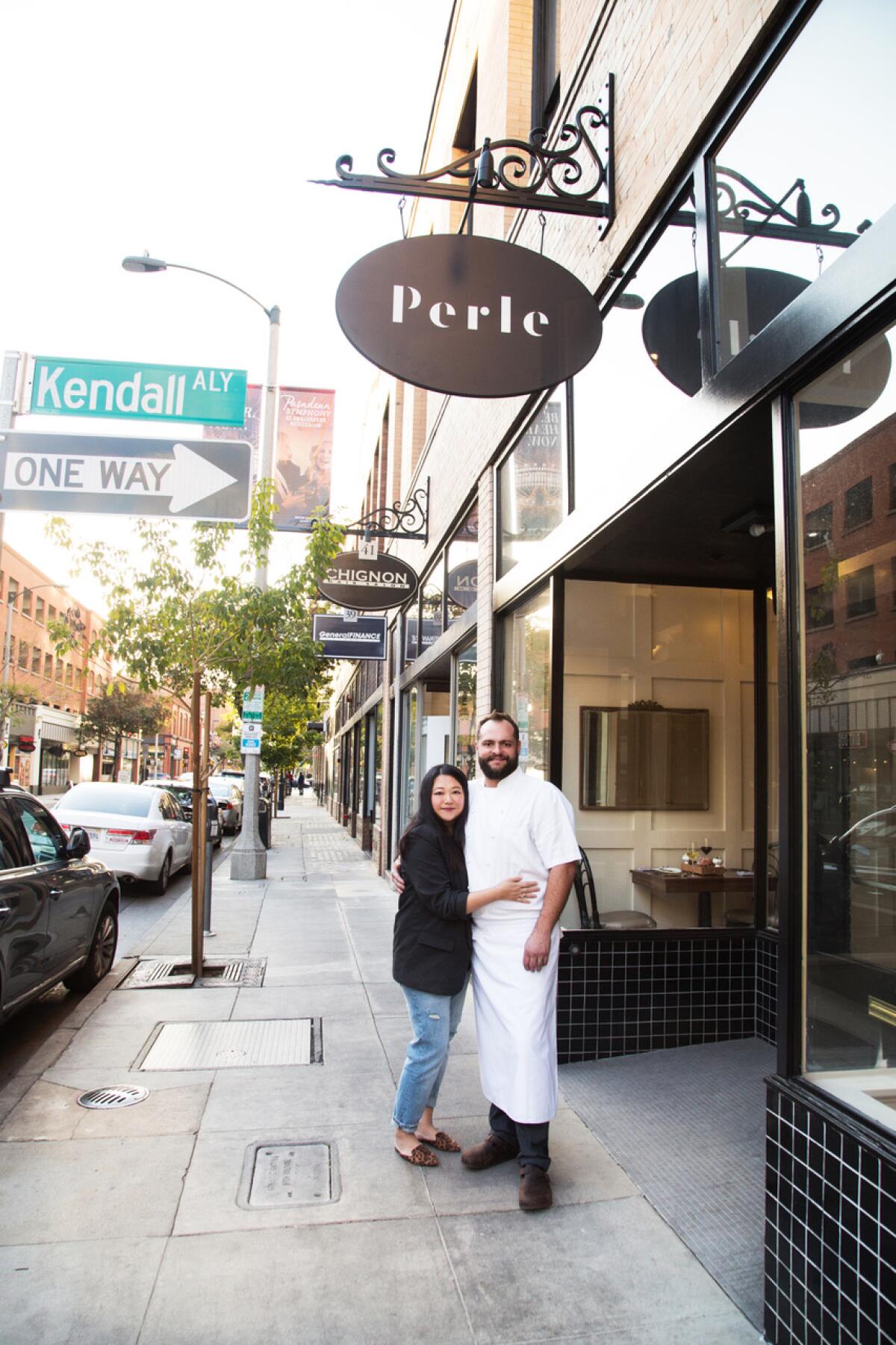
Pauline and Dean Yasharian stand in front of Perle, their French restaurant in Old Town Pasadena.
(Molly Donna Ware)
Even chefs with restaurants a safe distance from the fires have been affected. Food columnist Jenn Harris tells the story of Dean and Pauline Yasharian, who run the intimate French restaurant Perle in Pasadena’s Old Town but lost their Altadena home near Christmas Tree Lane. The Yasharians and fellow Old Town restaurateurs, including those at Bone Kettle, Osawa, Pez Cantina and Union, shared information they were getting about water and air quality as well as their reopening dates and number of customers. “Restaurants tend to really be affected during these disaster situations,” Dean Yasharian told Harris. “It’s a huge help for people to spread the word about Perle and to just go out and support your local restaurants.”
Chef’s wish lists
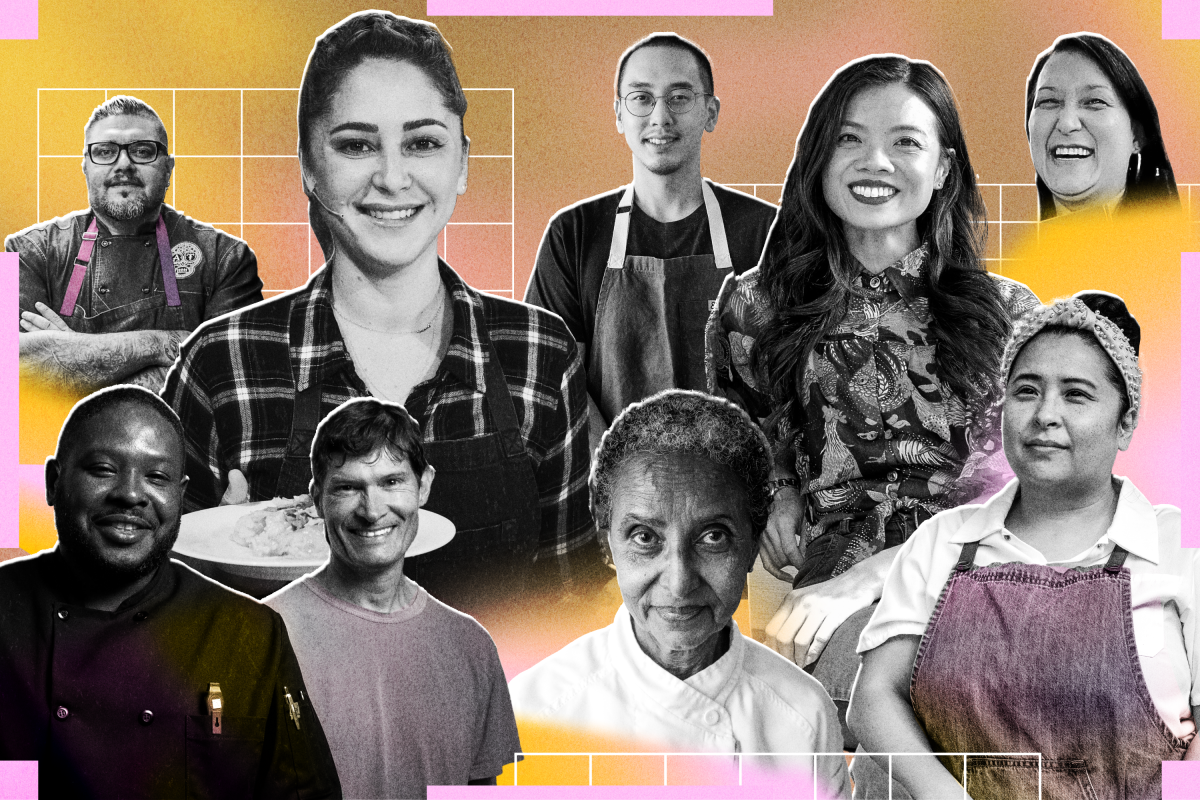
(Brandon Ly / Los Angeles Times; Photos by Laurie Ochoa, Myung J. Chun, Mariah Tauger, and Bill Addison / Los Angeles Times, Evan Agostini / AP)
Harris also talked to several chefs and restaurateurs about their hopes for 2025 even as so many of them were donating their time and food to feeding first responders and survivors of the Palisades and Eaton fires. And assistant food editor Danielle Dorsey details the many special dinners and fundraisers being done by restaurants across Southern California in support of fire relief efforts.
Also …
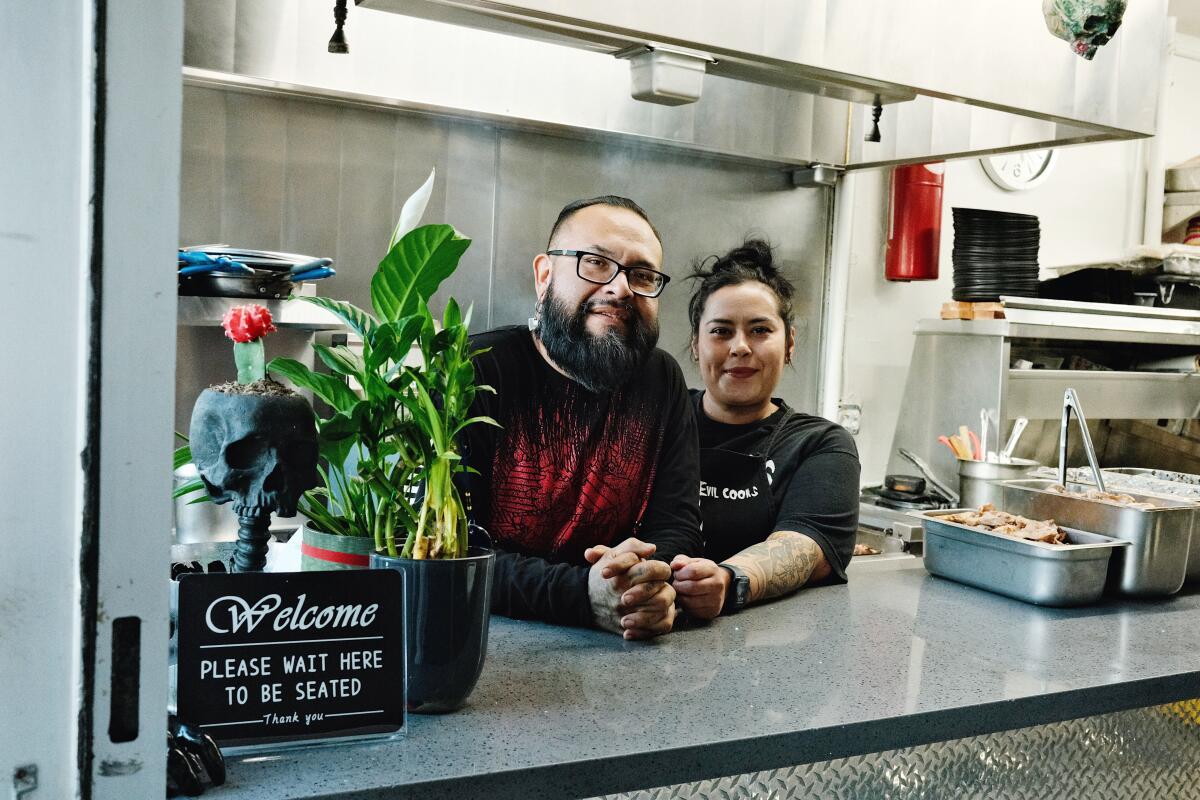
Evil Cooks owners and husband-and-wife team Alex “Pobre Diablo” Garcia, left, and Elvia “La Bruja” Huerta in the kitchen of their new bricks-and-mortar restaurant. They are semifinalists for best chef: California in the 2025 James Beard Awards.
(Stephanie Breijo / Los Angeles Times)
Newsletter
Eat your way across L.A.
Like what you’re reading? Sign up to get it in your inbox every week.
You may occasionally receive promotional content from the Los Angeles Times.
